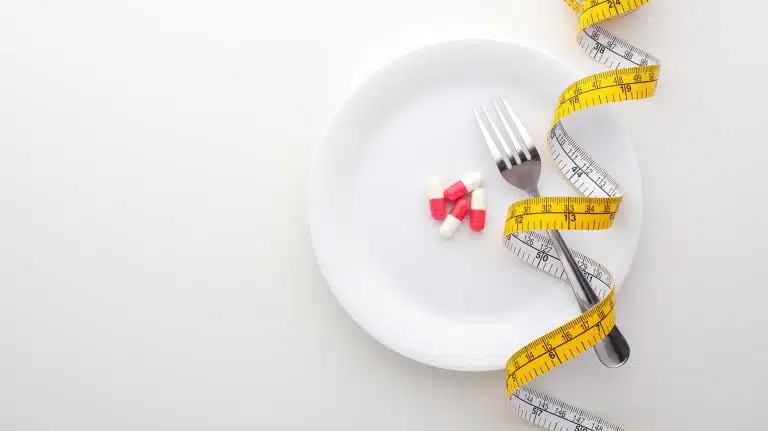Vyvanse & Weight Loss | What You Need To Know

Vyvanse (lisdexamfetamine dimesylate) is a prescription stimulant medication used to treat attention-deficit hyperactivity disorder (ADHD) and binge-eating disorder. Decreased appetite is a side-effect of many stimulants that have made them popular diet aids.
However, more research is needed on Vyvanse’s safety and effectiveness in the treatment of weight loss. Using Vyvanse for weight loss increases the risk of serious health effects, including overdose and addiction.
Does Vyvanse Cause Weight Loss?
Loss of appetite is one of the most common side-effects of Vyvanse and other central nervous system (CNS) stimulants.
Other CNS stimulant prescription drugs include:
- Adderall (amphetamine/dextroamphetamine)
- Ritalin (methylphenidate)
- Focalin (dexmethylphenidate)
Stimulants also activate dopamine in the reward pathways of the brain. Similar to stimulants and other addictive drugs, eating food also increases dopamine activity.
The effects of decreased appetite and increased dopamine make stimulants appear to have a high potential for treating obesity.
In fact, stimulants were once-popular weight-loss drugs, with prescription and over-the-counter pills readily available. However, research eventually found that stimulants could cause serious health effects.
Is Vyvanse Approved For Weight Loss?
The U.S. Food and Drug Administration (FDA) does not approve of using Vyvanse for weight loss. Any off-label use of Vyvanse for weight loss is considered misuse of the prescription.
Along with weight loss, Vyvanse may cause the following common side-effects:
- dry mouth
- constipation
- trouble sleeping
- anxiety
- appetite suppression
Effects Of Misusing Vyvanse
Normally, a prescribing doctor will start a person on a low dose of Vyvanse. The effects of the drug are monitored and the dose is slowly increased over a period of time. The ideal dose is the smallest dose that improves the condition with the least amount of side effects.
When someone misuses a prescription, they do not know the appropriate dose, which increases the risk of serious side effects.
Serious side-effects of Vyvanse include:
- increased blood pressure/heart rate
- stroke
- heart attack
- irregular heart rate
- sudden death
- mania
- psychosis
Long-term misuse of stimulants can also result in dependence and addiction. Once you become dependent on Vyvanse, your body needs it to function. If you suddenly stop taking Vyvanse, you are likely to experience psychological and physical withdrawal symptoms.
Vyvanse For Binge-Eating Disorder
Although Vyvanse isn’t approved to treat obesity or weight loss, it is FDA-approved for the treatment of a binge-eating disorder. Binge-eating disorder should not be compared with a desire to lose weight.
Binge-eating disorder involves episodes of compulsive overeating. Binge episodes are associated with psychological symptoms, including shame, guilt, and embarrassment.
Binge-eating disorder is classified as a mental health disorder but previously had no approved treatment medications. Vyvanse was briefly studied and quickly approved for treatment.
Important details from two clinical trials:
- each study was 12 weeks long with a total of 724 participants
- most people experienced a decrease in binging episodes at the end of the study
- higher doses were associated with better results
- long-term use may increase the risk of adverse effects
More research is needed to see if the compulsive behavior returns once Vyvanse is stopped. It is also unknown if weight gain occurs once the drug is stopped.
Vyvanse Dependence & Addiction
As a Schedule II controlled substance, Vyvanse has a high risk of abuse and dependence. Once your body becomes physically dependent on a drug, you may experience withdrawal symptoms once you stop.
Vyvanse withdrawal can be unpleasant and may cause serious depression and fatigue. This can lead to a cycle of returning to drug use to avoid withdrawal. Long-term use can lead to a substance use disorder (SUD), also known as addiction.
Someone addicted to Vyvanse may take it to lose weight, take high doses, or take it too frequently. They may take the drug compulsively, despite the negative consequences caused by drug use.
If you or a loved one is struggling with Vyvanse addiction, please contact us today to learn more about our addiction treatment programs.
Written by Ark Behavioral Health Editorial Team
©2024 Ark National Holdings, LLC. | All Rights Reserved.
This page does not provide medical advice.
Consumer Reports - Vyvanse - The Pill You Shouldn't Use To Lose Weight
Food And Drug Administration (FDA) - Vyvanse
National Library Of Medicine - Stimulants for the Control of Hedonic Appetite
National Library Of Medicine - Use of Lisdexamfetamine to Treat Obesity in an Adolescent with Severe Obesity and Binge Eating

Questions About Treatment?
Ark Behavioral Health offers 100% confidential substance abuse assessment and treatment placement tailored to your individual needs. Achieve long-term recovery.
100% confidential. We respect your privacy.
Prefer Texting?
Our friendly support team is here to chat 24/7. Opt out any time.







 Learn More
Learn More








